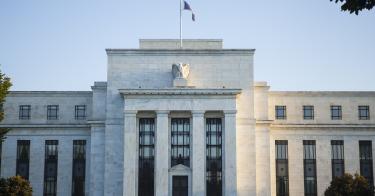Section 619 of Dodd–Frank, otherwise known as the Volcker Rule, was supposed to protect taxpayers by prohibiting banks from engaging in what is known as proprietary trading — that is, making risky investments solely for their own profit. Implementation of the rule was pretty much a fiasco, and both former Congressman Barney Frank and former Fed Chair Paul Volcker acknowledge that the final rule is too complicated.
Last week, federal regulators released a proposal to soften the Volcker rule, based largely on the size of banks’ trading operations. The proposal admirably tries to make lemonade out of lemons, while keeping the core idea of the Volcker rule in place. (Good overviews are here, here, and here.)
Nonetheless, on cue, groups such as Americans for Financial Reform and Allied Progress rolled out their casino gambling analogies, equating banks’ securities trading desks with gambling away taxpayer-backed deposits. Sen. Jeff Merkley, D–Ore., complained that the proposal is a “massive” rewrite that will “make it easier for Wall Street banks to engage in the same types of risky bets that brought down our economy in 2008.”
These complaints make great soundbites, but the Volcker rule had nothing to do with the types of risky bets that caused the 2008 crash. Had the Volcker rule been in place, banks still would have been able to make the same investments in the same types of securities and derivatives that caused so much trouble.
For the record, those activities were already heavily regulated by the feds. In fact, although it doesn’t fit the conventional narrative, regulators even had – and used – the authority to restrict banks’ proprietary trading before the crisis.
A more substantive critique of these “risky bet” claims is that the core principle behind the Volcker rule is flawed. It sounds perfectly reasonable that banks with access to taxpayer-backed funds should not be allowed to make risky bets for their own profits. But U.S. commercial banks bet with federally insured funds all the time.
The commercial lending business is about making long-term bets with shorter-term funds, most often composed of at least some federally insured deposits. Commercial loans are literally bets that the borrower will make all the rescheduled payments, thus keeping the bank in business. And it’s a very risky business.
It would be much easier to shrink taxpayers’ exposure to these risks than to micromanage every aspect of commercial banking.
The largest banks, for example, could easily go without FDIC deposit insurance. The largest institutions have backed FDIC privatization in the past, but the smaller banks have always been – and will continue to be – the big hurdle to any sort of FDIC privatization.
Community bank trade groups would likely protest even practical reforms that maintain federal protections for the average taxpayer because many so-called community banks rely on some form of taxpayer-insured wholesale funding. These groups regularly advocate for expanding federal deposit insurance, even though the current limit is $250,000 per account, more than 50 times the size of the average deposit account.
In theory, the FDIC deposit insurance scheme could be easily converted to a system that matches the original intent of protecting small depositors.
For instance, Congress could roll back FDIC coverage to the pre-1980 limit of $40,000 per account—still nearly 10 times the average transaction account balance of approximately $4,000, as per 2014 data. Congress could also apply coverage to the account holder rather than to the account, and require the FDIC to cover only personal bank accounts. This more sensible approach closely matches the original intent of the FDIC system.
Shrinking the FDIC footprint would also drastically reduce the crowding out effect of the current scheme, giving private markets the incentive to start different types of deposit insurance companies. The added economic activity would surely benefit average Americans.
These changes would ensure the FDIC system protects average depositors and taxpayers. Of course, community bank associations would hate this idea, especially because they would have to drop the pretense of their members needing FDIC coverage to attract grandmothers’ deposits.
There is also the matter of the Federal Reserve’s so-called emergency lending. If the Fed provides liquidity to the market through open market operations, adding selective loans when firms get into financial trouble is superfluous. It increases market distortions, moral hazard, and special interest lobbying. It perpetuates unhealthy economic activity that would not otherwise take place, and it creates more trouble than it is worth.
With everyone focused on the “risky bet” portion of the Volcker rule principle, it sure would be nice to see federal officials tackle the “access to taxpayer-backed funds” piece. That part is, after all, exactly what elected officials are supposed to control.
https://www.forbes.com/sites/norbertmichel/2018/06/05/nix-dont-fix-the-volcker-rule/2/#20742a4144ce
This piece originally appeared in Forbes



